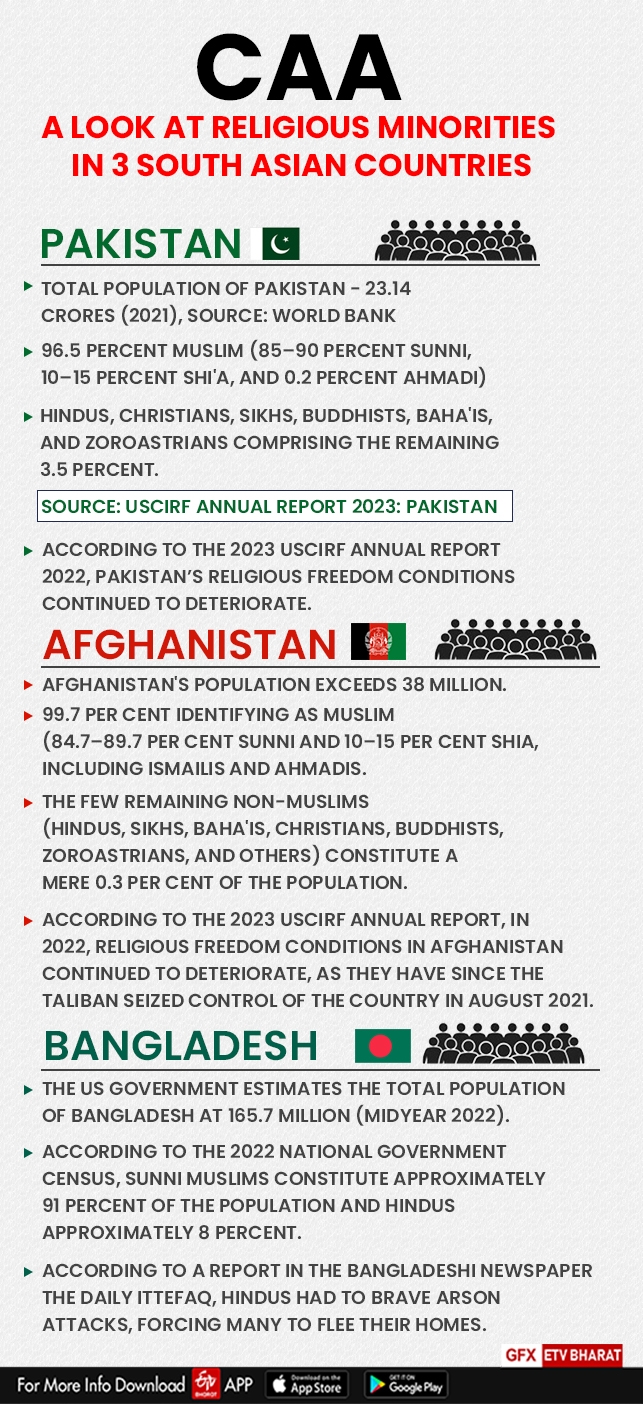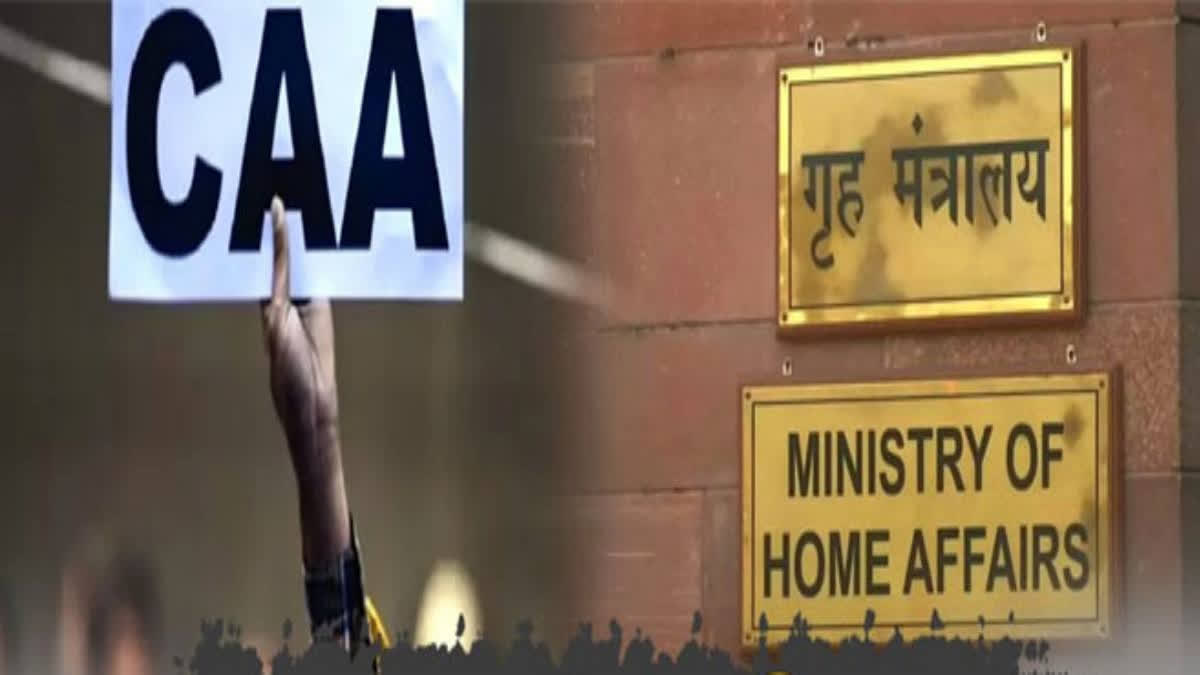New Delhi: With the Centre announcing the implementation of the contentious Citizenship Amendment Act (CAA) 2019 for granting citizenship to undocumented non-Muslim migrants from Pakistan, Bangladesh and Afghanistan, who came to India before December 31, 2014, the question arises as to who are these religious minorities being persecuted against in India’s three neighbouring countries. There are six religious minorities mentioned in the Act - Hindus, Sikhs, Jains, Buddhists, Parsis and Christians.
Pak Hindu Refugees To Get Indian Citizenship
Following the notification of the Act on Monday, Dharamveer Solanki, who is considered the chief of the Pakistani Hindu refugee community in Delhi, told PTI news agency that around 500 from the community will receive citizenship now.
“I and my family have been waiting for this for over a decade now,” Solanki was quoted as saying. “We are extremely happy that finally we will be called Indian citizens now. I am glad I decided to return to my homeland in 2013. It feels like a huge burden has been lifted from our shoulders. With the implementation of this act, around 500 Pakistani Hindu refugee families, who live here, will get citizenship.”
How Pak fares in US List of CPCs?
Let’s take the issue of persecution of religious minorities in Pakistan from an international perspective first. In January this year, Pakistan again found mention on the new US list of ‘Countries of Particular Concern’ (CPCs) for violations of religious freedom.

“Advancing the freedom of religion or belief has been a core objective of the US foreign policy ever since Congress passed and enacted the International Religious Freedom Act (IRFA) in 1998,” US Secretary of State Antony Blinken said while officially announcing the list. “As part of that enduring commitment, I have designated Burma, the People’s Republic of China, Cuba, the DPRK (Democratic People’s Republic of Korea or North Korea), Eritrea, Iran, Nicaragua, Pakistan, Russia, Saudi Arabia, Tajikistan and Turkmenistan as Countries of Particular Concern for having engaged in or tolerated particularly severe violations of religious freedom. In addition, I have designated Algeria, Azerbaijan, the Central African Republic, Comoros and Vietnam as Special Watch List countries for engaging in or tolerating severe violations of religious freedom.”
What Is IRFA?
The IRFA was passed to promote religious freedom as a foreign policy of the US to promote greater religious freedom in countries, which engage in or tolerate violations of religious freedom and to advocate on behalf of individuals persecuted for their religious beliefs and activities in foreign countries. The Act was signed into law by the then US President Bill Clinton on October 27, 1998. Three cooperative entities have been maintained by this act to monitor religious persecution: an ambassador-at-large for international religious freedom within the US State Department, a bipartisan United States Commission on International Religious Freedom (USCIRF), and a special adviser on international religious freedom within the National Security Council.
Findings of USCIRF
According to the 2023 USCIRF Annual Report 2022, Pakistan’s religious freedom conditions continued to deteriorate. “Religious minorities were subject to frequent attacks and threats, including accusations of blasphemy, targeted killings, lynchings, mob violence, forced conversions, sexual violence against women and girls, and desecration of houses of worship and cemeteries,” it stated. “Members of the Shia Muslims, Ahmadiyya Muslims, Christians, Hindus and Sikhs faced the continued threat of persecution via harsh and discriminatory legislation, such as anti-Ahmadiyya and blasphemy laws, as well as increasingly aggressive societal discrimination amid a rise in radical Islamist influence.”
Weaponising Blasphemy Laws
The report further states that these laws have enabled and encouraged radical Islamists to operate with impunity, openly targeting religious minorities or those with differing beliefs, including nonbelievers. It blamed the government of the then Prime Minister Shahbaz Sharif, which took office in April 2022, for weaponising the country’s blasphemy laws against former Prime Minister Imran Khan and his cabinet members.
“Religious minorities, however, were especially vulnerable to prosecution or violence based on blasphemy allegations in a society that has grown increasingly intolerant of religious diversity,” it further stated. “Blasphemy cases remained a substantial threat to religious freedom, as did the sort of mob violence that has long accompanied such accusations.”
In this connection, the report cited several incidents. One such case is that of Notan Lal, owner and principal of a private school in Ghotki, Sindh, who was sentenced to life in prison in February 2022 after a student had accused him of insulting the Prophet three years earlier. Another case cited was that of Muhammad Mushtaq, a mentally ill man accused of burning the Quran. This, too, happened in February 2022. An angry mob of 300 people in Punjab province stoned Mushtaq to death, after which his body was hanged from a tree.
Socital Violence, Targeted Killings
“Societal violence and targeted killings also continued to plague the country’s religious minorities,” the USCIRF story stated. “In January (2022), unknown gunmen killed a Christian priest and wounded another as they drove home from Sunday Mass in Peshawar.”
The slain priest was identified as 75-year-old Father William Siraj. Christians comprise about 2 per cent of Pakistan’s population of around 220 million. Another incident cited was that of the gunning down of two Sikh businessmen in Peshawar in May 2022 by unidentified gunmen. Saljeet Singh (42) and Ranjeet Singh (38) died on the spot after being attacked by two bike-borne assailants on May 15. These were but some of the incidents that were mentioned in the USCIRF report. It is worth mentioning here that it is not the first time that Pakistan has found its place in the US State Department’s list of CPCs.
USCIRF's Views on Persecution of Religious Minorities in Afghanistan
Afghanistan boasted of a diverse array of ethnic groups, with Pashtuns, Tajiks, Hazaras, Uzbeks, Turkmen, and Balochs being among the prominent ones. Historically, the nation embraced religious pluralism, but the Taliban's ascent to power in 1996 prompted a mass exodus of non-Muslims. Following the US withdrawal in August 2021, many of those who remained also fled the country.
Today, Afghanistan's population exceeds 38 million, with an overwhelming 99.7 per cent identifying as Muslim (84.7–89.7 per cent Sunni and 10–15 per cent Shia, including Ismailis and Ahmadis. The few remaining non-Muslims (Hindus, Sikhs, Baha'is, Christians, Buddhists, Zoroastrians, and others) constitute a mere 0.3 per cent of the population. Obtaining accurate statistics for smaller groups is challenging, as most members now live in hiding. However, estimates suggest that the Ahmadiyya Muslim community ranges from 450 to 2,500 individuals, while the Christian population may have reached 10,000 to 12,000 at the beginning of 2021. Notably, Zebulon Simentov, considered Afghanistan's last remaining Jew, departed the country in 2021.
Deteriorating Trend of Religious Freedom
According to the 2023 USCIRF Annual Report, in 2022, religious freedom conditions in Afghanistan continued to deteriorate, as they have since the Taliban seized control of the country in August 2021. “In contrast to its pledges for change and inclusivity upon its seizure of power, the Taliban has since ruled Afghanistan in a deeply repressive and intolerant manner—essentially unchanged from its previous era in power from 1996 to 2001,” it stated.
“Its rigorous enforcement on all Afghans of its harsh interpretation of Sharia violates the freedom of religion or belief of religious minorities; women; members of the lesbian, gay, bisexual, transgender, queer, and intersex (LGBTQI+) community; and Afghans with differing interpretations of Islam, such as predominantly Shia Muslim members of the ethnic Hazara community.”
Islamist Policing
The report further stated that the Propagation of Virtue and Prevention of Vice (MPVPV) enforces what its officials deem religiously appropriate conduct through a notoriously violent and hardline Islamist policing system that has been especially harsh and progressively worsening toward Afghan women.
“Despite continued promises to protect all ethnic and religious communities residing in Afghanistan, the Taliban’s de facto government has been unable or unwilling to provide religious and ethnic minorities safety and security against radical Islamist violence, particularly in the form of attacks by the Islamic State-Khorasan Province (ISIS-K) and factions of the Taliban itself,” it stated.
The Taliban reportedly assured the Sikh and Hindu communities of their safety shortly following the group’s takeover of Afghanistan in 2021. However, under the Taliban, Sikhs and Hindus have faced severe restrictions, including on their appearances, and have been banned from marking their religious holidays in public, leaving many with no choice but to escape their homeland.
“…Several incidents of vandalism and violence led many to flee the country in 2021 and 2022, leaving behind fewer than 100 Hindus and Sikhs,” the USCIRF report stated.
The Case of Bangladesh
Bangladesh is a secular democracy with Islam as the state religion. Despite constitutional protections for religious freedom, religious minorities in Bangladesh have faced various forms of persecution and discrimination over the years.
Hindus constitute the largest religious minority in Bangladesh, making up around 8 per cent of the population. They have been subjected to attacks, land grabs, forced conversions, and religious persecution, particularly during periods of political unrest or elections. The most recent instance was the parliamentary election in Bangladesh on January 7 this year. According to a report in the Bangladeshi newspaper The Daily Ittefaq, Hindus had to brave arson attacks, forcing many to flee their homes. There have been communal attacks across Bangladesh including in Faridpur, Sirajganj, Bagerhat, Jhenaidah, Pirojpur, Kushtia, Madaripur, Lalmonirhat, Daudkandi, Thakurgaon, Munshiganj and Gaibandha.
Demolitions of Houses, Places of Worship
Incidents of violence against Hindus, such as the demolition of homes and places of worship, have been reported, especially in rural areas. Hindu families have faced difficulties in reclaiming ancestral property due to discriminatory laws and practices.
For example, in 2016, the minority Hindu community was attacked by Islamic extremists in Nasirnagar Upazila over an allegedly defamatory social media post by a Hindu fisherman against Isla. The attack left 19 temples and approximately 300 houses vandalised and over 100 people injured.
According to a Bangladesh Jatiya Hindu Mohajote (BJHM) report, in 2017 alone, at least 107 people of the Hindu community were killed, 31 fell victim to enforced disappearance and 782 were either forced to leave the country or threatened to leave. Besides these, 23 were forced to get converted to other religions. At least 25 Hindu women and children were raped, while 235 temples and statues were vandalized during the year. The total number of atrocities that happened in the Hindu community in 2017 is 6,474. During the 2019 Bangladesh elections, eight houses belonging to Hindu families were set on fire in Thakurgaon.
Buddhists Being Abused
The Buddhist community in Bangladesh, mainly concentrated in the Chittagong Hill Tracts region, has faced discrimination and human rights violations. During the Bangladeshi Liberation War in 1971, Buddhist villages were targeted, leading to displacement and loss of life. Land disputes and encroachment on traditional Buddhist lands have been ongoing issues. The indigenous Jumma people, who practice Buddhism, have faced persecution and human rights abuses by the military and settlers.
Harassments of Christians
Christians make up a small minority in Bangladesh, accounting for less than 1 per cent of the population. They have reported instances of harassment, discrimination, and occasional attacks on churches and property. In 2023, the country was ranked as the 30th worst place in the world to be a Christian. In 2018, Bangladesh was number 41 on the World Watch List for religious persecution of Christians.
The Awami League government in Bangladesh has taken some measures to protect religious minorities, such as deploying security forces during religious festivals and enacting laws against communal violence. However, human rights organisations have criticised the government’s efforts as inadequate, and have called for stronger protections and accountability for perpetrators of violence against religious minorities.
Read More
- CAA applicants can attach 9 documents to prove country of origin, documents on arrival date in India
- Centre Launches New Portal to Apply for Indian Citizenship Under CAA
- Explained: What are CAA Rules? Eligibility, Documents Required, Process of Getting Citizenship
- Kerala: Indian Union Muslim League Moves SC Seeking Stay Of CAA Rules



